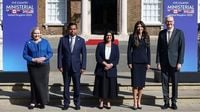In a decisive move to address the UK’s ongoing immigration challenges, newly appointed Home Secretary Shabana Mahmood has announced that countries refusing to accept the return of their nationals who have no legal right to remain in Britain could soon face the suspension of visa privileges. The announcement, made on September 8, 2025, marks Mahmood’s first major policy declaration since her appointment and signals a new era of tough, coordinated action on illegal migration and border security.
Mahmood’s stance was laid out during a summit in London with counterparts from the so-called Five Eyes alliance—comprising the United States, Canada, Australia, New Zealand, and the UK. According to ChronicleLive, the Home Secretary stated, “Abuse of our immigration system is a serious threat to public safety – and it is one we are confronting alongside our closest allies. This announcement sends a clear message to anyone seeking to undermine our border security. If you have no legal right to remain in the UK, we will deport you. If countries refuse to take their citizens back, we will take action.”
The Five Eyes meeting, attended by US Secretary of Homeland Security Kristi Noem, Canada’s Public Safety Minister Gary Anandasangaree, Australia’s Home Affairs Minister Tony Burke, and New Zealand’s Attorney General Judith Collins, was convened to strengthen cooperation on border security and discuss new strategies to manage migration flows. The ministers agreed to establish “clear obligations for countries to accept the return of individuals who have no legal right to remain,” as reported by The Daily Mail.
Mahmood elaborated on the potential consequences for non-cooperative countries: “For countries that do not play ball, we’ve been talking about how we can take much more coordinated action between the Five Eyes countries. For us, that means including possibly the cutting of visas in the future, just to say we do expect countries to play by the rules, and if one of your citizens has no right to be in our country, you do need to take them back.”
This approach could see visa restrictions imposed not just by the UK, but potentially in a coordinated fashion across all Five Eyes nations, amplifying the consequences for countries that fail to cooperate with deportations. Mahmood described the proposal as “an interesting space for collaboration, particularly on how we deal with countries who do not take their citizens back.”
The move comes amid mounting pressure on the Labour Government to get a grip on illegal immigration, particularly the surge in small boat crossings across the English Channel. According to The Mirror, more than 30,000 people have arrived by dinghy so far in 2025, with 1,097 making the journey on a single day, September 6. This represents a 37% increase compared to the previous year, figures deemed “utterly unacceptable” by government officials.
Mahmood, who is known within the Labour Party for her hardline stance on illegal immigration, has pledged to do “whatever it takes” to stop these crossings. “This is a Labour Government with Labour policy and Labour proposals. We’ve been looking at this for some time. It’s been discussed already across the Government and I’m very clear that there has to be a strong approach to maintaining our border, and that does mean saying to countries who do not take their citizens back that we’re not simply going to allow our laws to remain unenforced,” she said during the summit, as reported by ITV News.
The policy is not without precedent. The Nationality and Borders Act 2022, introduced by the previous Conservative Government, already granted the Home Secretary powers to impose “visa penalty provisions” on countries that do not cooperate in returning their nationals. Shadow Home Secretary Chris Philp was quick to point out the origins of the power, stating, “The power to implement visa sanctions was created by the last Conservative Government in a bill which I took through Parliament. It’s about time this Labour Government now stopped talking tough and started acting tough.”
Philp further called for immediate action, saying, “Any country that won’t take back its own citizens who have committed a criminal offence in the UK or who have no right to be here should see visa issuance suspended. But all we get from Labour are tough words. I urged them to immediately use the powers which the last Government created some months ago, but nothing has happened.” He also advocated for cutting overseas aid to non-cooperative countries, criticizing the Labour Government as “too weak to take the steps necessary to protect our borders.”
Amid these political crosscurrents, the Government is grappling with the logistical challenge of housing asylum seekers. As of the end of June 2025, around 32,000 people were being accommodated in hotels while their asylum applications were processed. The use of hotels has become a flashpoint for public protests and political debate. Prime Minister Keir Starmer has tasked ministers with accelerating the closure of these hotels.
To that end, the Government is considering the use of military bases and other large sites as temporary accommodation for asylum seekers. Defence Minister Luke Pollard confirmed that military planners are reviewing all available sites, including the previously shelved RAF Scampton project. “We’ve deployed a military planning team into Border Security Command and the Home Office to look at military and non-military sites, about where we can help build temporary but adequate accommodation that enables us to transfer those folks from asylum hotels into that temporary accommodation so we can close even more hotels. We’ve closed 25 in the last year, but the Prime Minister is clear he wants every single one of them closed,” Pollard told ITV’s Good Morning Britain.
The debate over immigration policy remains heated. While Labour’s new leadership is eager to demonstrate resolve, critics from the Conservative bench argue that the Government is simply repackaging old policies without decisive action. The issue of small boat crossings, in particular, continues to dominate headlines and stir public anxiety.
For now, the Government’s “Plan for Change” has reportedly led to an increase in returns and disruption of criminal networks since July 2024, but the scale of the challenge remains daunting. Whether Mahmood’s vow to “do whatever it takes” will translate into tangible results is a question that will hang over Westminster in the months ahead.
As the Five Eyes allies present a united front on border security, the UK’s message is clear: countries that do not cooperate with the return of their nationals should expect to face real consequences—not only from Britain, but possibly from a powerful coalition of its closest partners.


